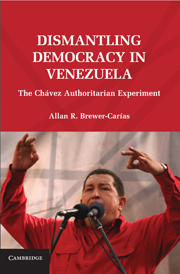Book contents
- Frontmatter
- Contents
- AUTHOR'S NOTE
- INTRODUCTION DEFRAUDING DEMOCRACY THROUGH NONCONSENSUAL CONSTITUENT ASSEMBLIES
- PART ONE THE POLITICAL ASSAULT ON STATE POWERS AND THE FRAMEWORK FOR AUTHORITARIANISM
- PART TWO INSTITUTIONAL DEVELOPMENT TOWARD CONSOLIDATING AUTHORITARIANISM
- Chapter 5 CONSTITUTIONAL FRAUD AND DEFRAUDING DEMOCRACY
- Chapter 6 THE REINFORCED CENTRALIZATION OF THE FEDERATION
- Chapter 7 CONCENTRATION OF POWERS AND AUTHORITARIAN GOVERNMENT
- Chapter 8 THE CATASTROPHIC DEPENDENCE AND POLITICAL SUBJECTION OF THE SUPREME TRIBUNAL OF JUSTICE
- Chapter 9 STATE APPROPRIATION, NATIONALIZATION, EXPROPRIATION, AND CONFISCATION OF PRIVATE ASSETS
- PART THREE CONSTITUTIONAL REFORMS DESIGNED TO CONSOLIDATE AUTHORITARIANISM
- INDEX
Chapter 8 - THE CATASTROPHIC DEPENDENCE AND POLITICAL SUBJECTION OF THE SUPREME TRIBUNAL OF JUSTICE
Published online by Cambridge University Press: 05 June 2012
- Frontmatter
- Contents
- AUTHOR'S NOTE
- INTRODUCTION DEFRAUDING DEMOCRACY THROUGH NONCONSENSUAL CONSTITUENT ASSEMBLIES
- PART ONE THE POLITICAL ASSAULT ON STATE POWERS AND THE FRAMEWORK FOR AUTHORITARIANISM
- PART TWO INSTITUTIONAL DEVELOPMENT TOWARD CONSOLIDATING AUTHORITARIANISM
- Chapter 5 CONSTITUTIONAL FRAUD AND DEFRAUDING DEMOCRACY
- Chapter 6 THE REINFORCED CENTRALIZATION OF THE FEDERATION
- Chapter 7 CONCENTRATION OF POWERS AND AUTHORITARIAN GOVERNMENT
- Chapter 8 THE CATASTROPHIC DEPENDENCE AND POLITICAL SUBJECTION OF THE SUPREME TRIBUNAL OF JUSTICE
- Chapter 9 STATE APPROPRIATION, NATIONALIZATION, EXPROPRIATION, AND CONFISCATION OF PRIVATE ASSETS
- PART THREE CONSTITUTIONAL REFORMS DESIGNED TO CONSOLIDATE AUTHORITARIANISM
- INDEX
Summary
The effects of the dependency of the branches of government subjected to the legislative power, and through it to the executive, have been particularly catastrophic for the judiciary. The Constituent Assembly initially intervened in the judiciary's powers in 1999, and such intervention continued with the Supreme Tribunal of Justice's unfortunate consent and complicity. In the past decade, the country has witnessed permanent and systematic demolition of the autonomy and independence of the judicial power, aggravated by the fact that, according to the 1999 Constitution, the Supreme Tribunal, which is completely controlled by the executive, is in charge of administering the entire Venezuelan judicial system, particularly by appointing and dismissing judges.
THE SUBJECTION OF THE SUPREME TRIBUNAL OF JUSTICE
The process began with the appointment, in 1999, of new Magistrates of the Supreme Tribunal of Justice without complying with the constitutional conditions, made by the Constituent Assembly itself, by means of a constitutional transitory regime sanctioned after the Constitution was approved by referendum. From that point, intervention in the judiciary has continued, including the fact that the president has politically controlled the Supreme Tribunal of Justice and, through it, the complete Venezuelan judicial system.
The Confiscation of Civil Society's Right to Participate in the Appointment of the Magistrates of the Supreme Tribunal in 2000
As mentioned, one of the principal purposes of the constitution-making process of 1999 was to reform the procedure for the appointment of the nonelected officials of the state, in a way out of the reach of the political parties' control and with citizens' participation in such appointments, thus removing the absolute discretion that the former Congress had on the matter.
- Type
- Chapter
- Information
- Dismantling Democracy in VenezuelaThe Chávez Authoritarian Experiment, pp. 226 - 244Publisher: Cambridge University PressPrint publication year: 2010



